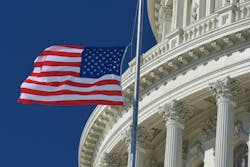U.S. legislation and directives for domestic drug manufacturing
In our June cover story, Mining pharma's reshoring rush, we discuss the U.S. movement to repatriate generic drugs, APIs and ingredients.
Reshoring has found some of its most fervent supporters inside the halls of Congress, with leaders touting the idea as a catch-all cure to pharma’s longstanding supply chain ills and putting forth a rush of legislation. Both President Trump and President Biden have also championed the movement, issuing several executive orders and directives.
Below we have outlined some of the most relevant legislation and directives.
Coronavirus Aid, Relief and Economic Security Act
March 2020
The CARES Act included several provisions regarding the supply chain, including: additional drug and API shortage and sales volume reporting requirements for manufacturers, a requirement to develop redundancy risk management plans for each establishment in which the drug or API is manufactured, and a study by the National Academies of Sciences, Engineering and Medicine on the national security and public health threats related to the U.S. global pharma supply chain.
Ensuring Essential Medicines, Medical Countermeasures and Critical Inputs are Made in the United States
August 2020
The ‘Buy American’ executive order (13944) directed federal agencies to identify vulnerabilities in the supply chain, support domestic production through various incentives and investments, and prioritize the procurement of essential medicines, countermeasures and critical inputs from U.S. manufacturers. It also directed the FDA to identify a list of essential medicines that are medically necessary to have available at all times in an amount adequate to serve patient needs.
America’s Supply Chains
February 2021
The executive order (14017) initiated an all-of-government 100-day review of the supply chains that underlie the U.S. industrial base, among them pharmaceuticals and APIs. The order also directed HHS to create a one-year report on the public health supply chain and industrial base outlining successes and practical strategies.
Advancing Biotechnology and Biomanufacturing Innovation for a Sustainable, Safe and Secure American Bioeconomy
September 2022
The executive order (14081) laid out a vision for a whole-of-government approach to advance biotech and biomanufacturing by creating a research agenda. The order launched a National Biotechnology and Biomanufacturing Initiative to ensure that the U.S. has the domestic capacity to make bio-based products. Included was also a $40 million investment to expand the role of biomanufacturing for APIs, antibiotics and relevant key starting materials needed to produce essential medications and respond to pandemics.
Consolidated Appropriations Act 2023
December 2022
The omnibus appropriations bill included $1.7 trillion in fiscal year 2023 discretionary government funding for all 12 annual spending bills, as well as a number of other health care provisions. The bill contained important reforms relevant to the FDA, including the Food and Drug Omnibus Reform Act of 2022 (FDORA) and the Prepare for and Respond to Existing Viruses, Emerging New Threats, and Pandemics Act (PREVENT Pandemics Act). FDORA directed the FDA to establish advanced manufacturing centers for excellence and an advanced manufacturing technologies designation program.
Bold Goals and Priorities to Advance American Biotechnology and Biomanufacturing
March 2023
In response to the executive order issued in September 2022, this initiative set ambitious national targets for the next two decades to help establish R&D priorities that will be critical to advance the bioeconomy. Specifically for pharma, it aims to deploy broad synthetic biology and biomanufacturing capabilities in the U.S. within five years to produce 25% of all APIs for small molecule drugs.
Actions to Strengthen America’s Supply Chains
November 2023
During the inaugural meeting of the White House Council on Supply Chain Resilience, 30 actions designed to strengthen supply chains across multiple industries were unveiled. Among them, the use of the Defense Production Act to make more essential medicines in the U.S. and mitigate drug shortages. This included $35 million for investments in domestic production of key starting materials for sterile injectable medicines and the designation of a new Supply Chain Resilience and Shortage Coordinator.
About the Author
Karen P. Langhauser
Chief Content Director, Pharma Manufacturing
Karen currently serves as Pharma Manufacturing's chief content director.
Now having dedicated her entire career to b2b journalism, Karen got her start writing for Food Manufacturing magazine. She made the decision to trade food for drugs in 2013, when she joined Putman Media as the digital content manager for Pharma Manufacturing, later taking the helm on the brand in 2016.
As an award-winning journalist with 20+ years experience writing in the manufacturing space, Karen passionately believes that b2b content does not have to suck. As the content director, her ongoing mission has been to keep Pharma Manufacturing's editorial look, tone and content fresh and accessible.
Karen graduated with honors from Bucknell University, where she majored in English and played Division 1 softball for the Bison. Happily living in NJ's famed Asbury Park, Karen is a retired Garden State Rollergirl, known to the roller derby community as the 'Predator-in-Chief.'
